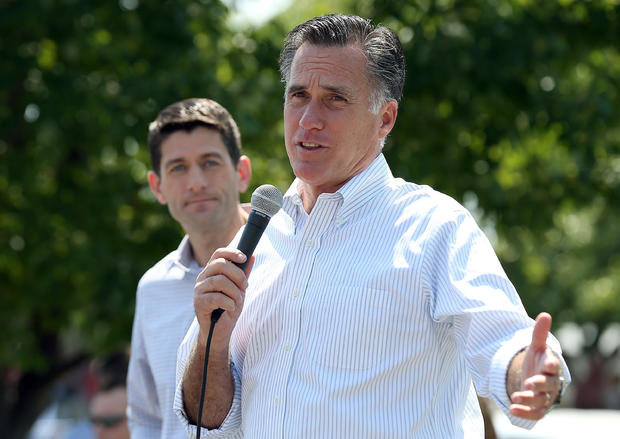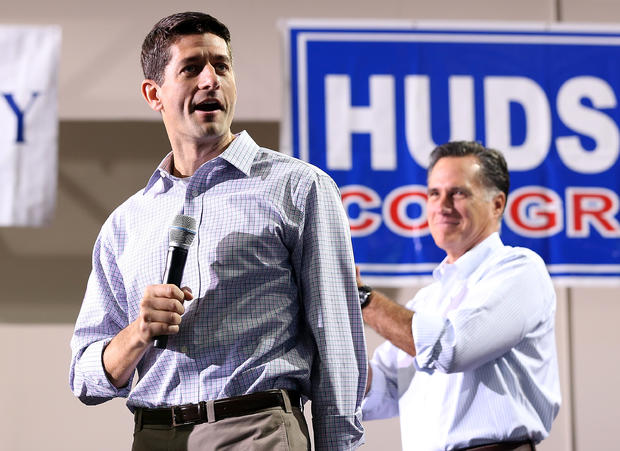Does the Romney-Ryan lack of foreign policy experience matter?
(CBS News) Among the perceived weaknesses on former venture capitalist and Massachusetts governor Mitt Romney's presidential resume is a lack of experience in handling foreign policy. His choice of a running mate doesn't help much in that department.
Rep. Paul Ryan, R-Wis., author of the House GOP budget, has spent his congressional career focused on fiscal policy: He's the chairman of the House Budget Committee and also serves on the tax-writing Ways and Means Committee. While Ryan, who is 42, has occasionally addressed foreign policy, his focus has overwhelmingly been elsewhere. And neither he nor Romney has served in the military.
Even before the Ryan pick, Republicans were struggling to articulate their presumptive nominee's qualifications to be commander-in-chief. Asked by Foreign Policy earlier this month to explain why Romney was ready to lead the U.S. internationally, Sen. Ron Johnson, R-Wisc., reportedly paused and took a deep breath before responding. "Listen, he's certainly traveled the world in business, which is good," he said. Johnson then suggested Romney's commitment to America's economic security translates to strong national security.
The 2012 election, of course, is likely to be decided largely on domestic economic matters. With Americans largely focused on the still-fragile economic recovery, foreign policy has gotten relatively little attention from the presidential candidates. But it's worth noting that Romney and Ryan have less experience on foreign policy than most, if not all, of the presidential tickets over the past several decades.
Consider recent history. President Obama, who served on the Senate Foreign Relations Committee during his brief Senate tenure, blunted criticism of his lack of foreign policy experience by picking Joe Biden, the longtime chairman of that committee, as his running mate. The Republican ticket in 2008 was headed by former war hero Sen. John McCain, the ranking member of the Armed Services Committee.
The 2004 Democratic ticket was led by military veteran Sen. John Kerry, a longtime member of the Foreign Relations Committee. The 2000 and 2004 Republican ticket included former Gov. George W. Bush, who had some military experience in the National Guard but virtually no foreign policy experience. He chose former Secretary of Defense Dick Cheney to boost the ticket's foreign policy credentials.
2000 Democratic nominee Al Gore had been vice president for eight years, and his running mate, Sen. Joe Lieberman, had served on the Senate Armed Services Committee. The GOP nominees in 1996, Bob Dole and Jack Kemp, were both veterans.
Arguably, the 1992 Democratic ticket was light on foreign policy experience, as Bill Clinton only had experience as Arkansas governor. But that ticket still seems to trump Romney-Ryan: Vice Presidential nominee Al Gore had served as a military journalist in Vietnam as well as on the Senate Intelligence Committee. (For more examples of the party nominees' foreign policy and military experience dating back to 1972, check out this post from Salon.com.)
Former Massachusetts Gov. Michael Dukakis, the 1988 Democratic presidential nominee, is an Army veteran who saw an infamous photo of him riding in a tank turned into an ad that suggested he would be soft on defense. He told CBS News the Romney-Ryan ticket's lack of foreign policy experience matters.
"Romney's trip abroad was a disaster," he said in reference to Romney's gaffe-filled swing through London, Israel and Poland.
It's a claim echoed by Obama campaign adviser Stephanie Cutter.
"Well, I think that the most important criteria is the person at the top having the judgment on foreign policy that you need in a commander in chief, and I think that we saw just a week and a half ago, that Mitt Romney didn't have it," she said on CBS' "Face the Nation"Sunday. "He went on a foreign policy trip, and ended up insulting every one of our allies, and embarrassing this country."
Republicans have attempted to downplay their ticket's lack of foreign policy experience in a few ways. Newt Gingrich said on "Face the Nation"that it was actually an advantage, since "they are not part of the current mess." Also on "Face the Nation," Romney adviser Eric Fehrnstrom said that "Paul Ryan has the same amount of experience that Barack Obama had when he was sworn in." Speaking on NBC, Republican National Committee Chairman Reince Priebus pointed to Ryan's trips oversees while in Congress.
McCain and Gingrich have noted that Romney has as much foreign policy experience as Ronald Reagan had when he took office, and McCain has pointed to Romney's two years as a Mormon missionary in France and his relationship with Isreali leader Benjamin Netanyahu. More broadly, Republicans say the Obama administration has been a foreign policy disaster, arguing that it has botched the uprising in Syria, the U.S. relationship with Israel and the Arab Spring. Romney and Ryan, they argue, will be guided by foreign policy experts who will put the nation on a better path.
Asked about the Romney-Ryan ticket's lack of foreign policy experience, a top Romney staffer pointed to Ryan's congressional trips overseas, his expertise in international economic policy, and his budget oversight responsibility, which includes defense.
"The fact that his budget prowess overshadows his foreign policy expertise doesn't mean the latter is non-existent," the staffer said.
While Romney has harshly attacked Mr. Obama on foreign policy, there seems to be little daylight between the two when it comes to most foreign policy issues. (One key exception: Romney disagrees with the president's push to eventually eradicate nuclear weapons. Romney has also vowed to label China a currency manipulator.) Ryan, who voted to authorize the Iraq war, delivered a foreign policy address in June of last year that called for America to be a global leader. Both Romney and Ryan say they would increase the amount of money America spends on defense while significantly reducing federal spending elsewhere.
Thomas Mann, Senior Fellow in Governance Studies at the Brookings Institution, argues that Romney and Ryan's lack of foreign policy experience will not be a significant campaign issue unless there is a particularly significant development abroad before the November election. Even if such a surprise does take place, he said, the impact on the campaign is unpredictable.
"Because of the extraordinary focus on domestic matters, and similarly the economic-related focus of most foreign policy concerns, I think the absence of traditional foreign policy experience is not particularly damaging this year," he said.
Mann added: "Especially with the addition of Ryan to the ticket, you'll be hearing very little on foreign policy from the Republicans."

